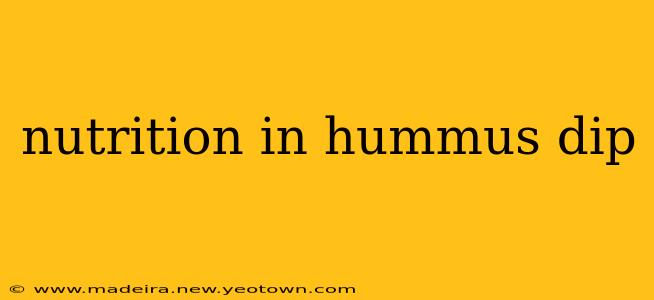Hummus, that creamy, dreamy dip made from chickpeas, tahini, lemon juice, and garlic, has taken the world by storm. But beyond its delicious taste and versatility, hummus boasts a surprisingly impressive nutritional profile. This isn't just a tasty snack; it's a nutritional powerhouse packed with benefits for your health. Let's dive into the delicious details.
What are the main nutritional benefits of hummus?
The nutritional benefits of hummus stem from its core ingredients. Chickpeas, the star of the show, are an excellent source of plant-based protein, fiber, and various essential minerals. Tahini, made from sesame seeds, adds healthy fats, particularly monounsaturated fats, which are beneficial for heart health. Lemon juice provides Vitamin C, a potent antioxidant, while garlic contributes to its flavor and offers potential immune-boosting properties. Together, these create a nutritional symphony in every spoonful.
Is hummus good for weight loss?
Hummus can absolutely be part of a weight-loss strategy. Its high fiber content promotes satiety, meaning you'll feel fuller for longer, reducing overall calorie intake. The protein content also contributes to feeling satisfied, preventing those mid-afternoon cravings. However, like any food, moderation is key. Portion control is crucial, as even healthy foods can contribute to weight gain if consumed in excess. Choose homemade hummus or options with minimal added oils or sugars for optimal weight management benefits.
How many calories are in a serving of hummus?
The calorie count of hummus can vary depending on the brand and ingredients. A typical serving (about ¼ cup) generally contains between 80-100 calories. However, this can increase significantly if the hummus is made with a lot of added oil. Always check the nutrition label to be sure. Opting for homemade hummus allows for greater control over the ingredients and calorie content.
Is hummus high in fat?
While hummus does contain fat, primarily from the tahini, it's predominantly healthy unsaturated fats. These are the "good" fats that contribute to heart health and help regulate cholesterol levels. It's the type of fat, not just the amount, that matters most. Compare this to the unhealthy saturated and trans fats found in many processed foods, and hummus comes out as a much healthier choice.
What are the potential downsides of eating hummus?
While hummus is generally a healthy food, there are a few potential downsides to consider. Some individuals might experience digestive discomfort due to the high fiber content, especially if they are not used to consuming a lot of fiber. Additionally, some commercially produced hummus brands may contain added sugars, sodium, or preservatives, which can negate some of the health benefits. Always check the ingredient list before purchasing and opt for simpler, less processed options.
Can I eat hummus every day?
Yes, you can certainly incorporate hummus into your daily diet as part of a balanced eating plan. Its nutritional benefits make it a worthy addition to your meals. Remember to be mindful of portion sizes and choose brands with minimal added ingredients to maximize its health benefits. A daily serving of hummus can be a delicious and nutritious way to boost your overall health.
In conclusion, hummus offers a delicious and convenient way to boost your nutritional intake. From its fiber and protein content to its healthy fats and essential minerals, it truly is a superfood in dip form. Enjoy it guilt-free, but remember that moderation and mindful choices are key to reaping all its health benefits.

